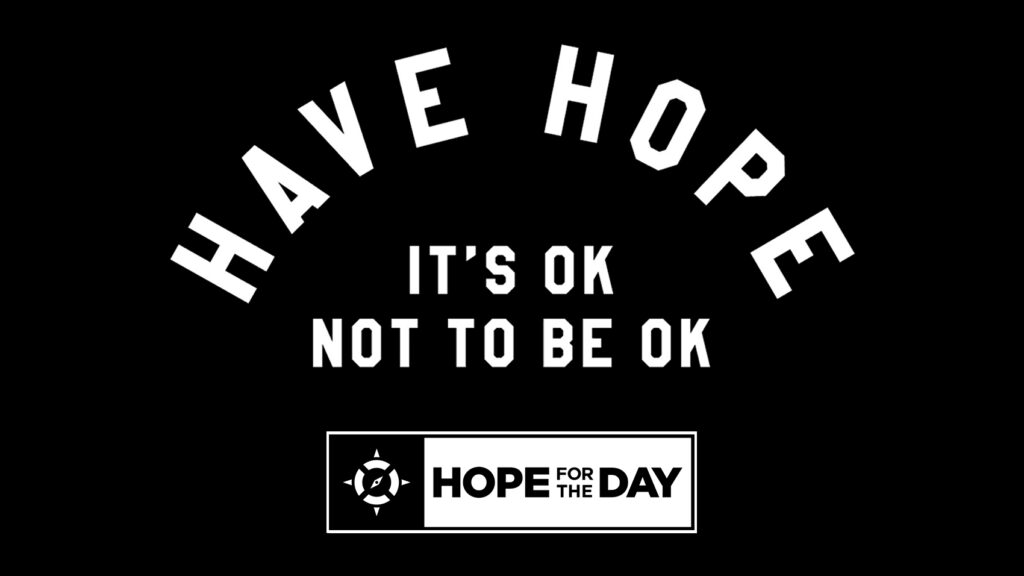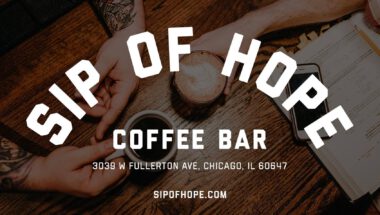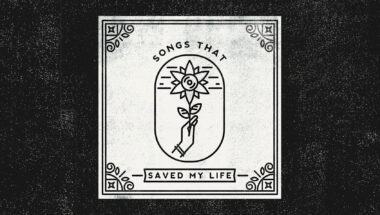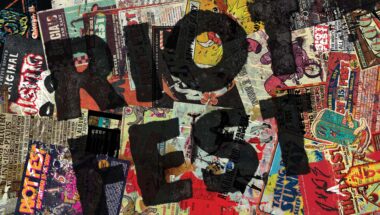When Chicago punk/metal promoter Jonny Boucher’s mentor, fellow promoter Mike Scanland, died by suicide in 2010, it was a big wake-up call. Boucher immediately set about making fliers to hand out at shows with suicide prevention resources, which then turned into him taking the stage for a few minutes at shows to talk about the issue. These actions ultimately morphed and grew into the nonprofit Hope For the Day, which has launched initiatives both in the Chicago area and around the world with the goal of improving the public’s understanding of mental health and access to suicide prevention tools.
Though its roots are still in the music community, Hope For the Day is also increasingly active in veteran, LGBTQ, and arts communities, and has been slowly increasing its presence in public schools and corporate environments. its latest project, the Sip of Hope Coffee Bar in Logan Square (a collaboration with Dark Matter Coffee), is designed to increase access to mental health tools within the local community, while also serving up some of the best coffee in the city.
Riot Fest recently spent some time on the phone with Mike Vinopal, Hope For the Day’s Director of Education and Outreach. Aside from his general work for the organization, Vinopal also spearheads the Beatkeepers program, where students make beats, do free writing and make songs together to learn social and emotional literacy skills, and develop those skills through collaborative composition.
RIOT FEST: What exactly does your work at Hope For the Day entail?
MIKE VINOPAL: At Hope For the Day, we try to activate as many people as we can in our various communities — be that Warped Tour, where Jonny speaks from the stage in 40-50 cities across the country, or a more localized thing where Carl [Evans, Director of Programs & Operations] and I are doing first aid and mental health training in schools, corporations, libraries — and just generally try raise the visibility of resources available for mental health, so that people won’t feel so lost if they’re struggling, or if they want to help someone else that is struggling. We’re trying to educate people, allowing them to become empowered, effective, and impactful in their own communities when encountering someone struggling with a mental health challenge. The hope is to get more people being more proactive with suicide prevention, and saving some lives. We want to help people talk more frequently about their mental health, so that it doesn’t so often get to the point of crisis, where their issues are adversely affecting their lives, or that of those around them. The more we talk about it, the more we can get in front of it.
An important part of your mission is to be proactive, not reactive. With that in mind, what are some tools that might help people recognize when action might be necessary, either for their own mental health, or that of a friend or loved one?
Traditionally, with reactive approaches, people wait until someone has completed suicide, or until there’s some loss of life or tragedy in the community, and then they’re comfortable talking about the situation in a reactive way. Then, two weeks go by, and people go back to being silent on the topic.
What we try to do is to help people understand the possible risk factors at play, and to minimize those risk factors by educating people on seeing those red flags. Ultimately, the goal is to have people working in their own spheres, with people they know very well and see on a day-to-day basis, and have them know typical patterns so that they’ll notice significant changes in individual behavior, and then to have them have the tools to approach people with compassion and let them know that “it’s OK to not be OK.” That’s why we have that slogan plastered all over our shirts and our resource cards and everything. It’s not just marketing, it’s a call to arms to help people feel less alone, to know that their experiencing a mental health challenge doesn’t make them lesser or weak. There’s nothing to be ashamed of.
Society has done a disservice to our youth by teaching them how to maintain physical health without acknowledging a very important organ, our brain. We try to make it very clear to people that mental and physical health aren’t really separate; they’re very linked. We encourage people to share with their loved ones and communities the things they do when they’re having a lousy day or struggling, what they do to work through things and feel better. Most importantly, we try to teach people to be comfortable sharing when they need help. Sometimes, you need additional resources to get through things you’re experiencing.
Hope For the Day was initially an outgrowth of communication about mental health and suicide prevention in the punk/metal community around Chicago; at the outset, Jonny Boucher was primarily trying to get information to at-risk people at shows and the like. How central is the music community to the organization’s mission at this point?
Very central. We stay true to our roots… we know that the punk/hardcore/metal community attracts a lot of youths, many of whom are experiencing lots of pain, and that’s still a really big part of our outreach. It’s a really good place to activate people, too, because at a show, you don’t have as many of the stigmas you might experience in regular society, in your daily life. It’s a little more free, and there’s a vibe of looking out for each other, whether it be in the mosh pit, or making sure someone who’s partied too hard gets a safe ride home, or whatever.
Yes, we’ve definitely expanded: we’re involved in the art community with our pop-up shows, and are connecting with a lot of visual artists to amplify the message. In the last year, we’ve gotten more involved in schools and even the corporate world, with entities who have decided to be proactive with their employees, letting them know that sick days can be for mental health and things like that. We’ve grown beyond the music community, but I don’t think we’ll ever faze that out. It’s a powerful platform to reach a lot of people, and the more people we reach, the more potential there is for lives to be saved.
Another interesting place you’re using to reach out is a new coffee shop, Sip of Hope, where 100 percent of the proceeds support suicide prevention and mental health education. How did that venture come about? Beyond the financial benefit, how do you hope that that space will broaden the reach of your message?
We’re very lucky to have lots of powerful allies in our mission, one of which is Dark Matter Coffee! They’ve been our biggest partner in prevention since day one. Originally, it started off with them roasting a particular coffee blend, also called Sip of Hope; the proceeds from those bags of coffee help fund some of our programming in the early days. The partnership with Jesse Diaz and the Dark Matter crew grew from there. Last summer, their block party raised close to $30,000 for our programming! Through years of going for that moonshot of having a community space, which went through many iterations and a lot of brainstorming, it came to this point. On May 3, we’re having a ribbon-cutting, with Chicago dignitaries there to help amplify the message.
We’ve had a strong visibility in all in all the Dark Matter coffee shops around the city for some time, and they’re incredibly successful, so Jonny and Jesse decided to take it a step further. They found the space, raised a significant amount of the funds last December at our gala, and now it’s finally here. It’s going to be a really cool hub for resources, education, and training. Also, all of the staff is trained in mental health first aid as a requirement of their employment, so you’ve got people behind the coffee bar that are in tune with what it takes to be a responsible, supportive, compassionate member of the community, and who are looking out for people who might be having mental health challenges.
Sip of Hope is right across the street from the Logan Square Public Library, and pretty close to the Blue Line, so we’re hoping that we’ll be able to become a more powerful force in the community, and create a ripple effect within other communities nearby. Logan Square has a very diverse population, so we won’t just be limited to art/music people: we’ll be potentially reaching people who are, y’know, just commuting to work and stop in for a coffee, then all of a sudden they’ll be getting all this messaging, and hopefully they’ll understand that there’s more that they can do for their family, friends, whatever.
For the time this organization has been around, we’ve done a lot of outreach work all across the country and overseas, and now we’re trying to get a laser focus on Chicago. This is our backyard. We need to be doing whatever we can to improve mental health issues here, and this will be a major step towards creating a more compassionate, resilient community.
Suicide completion rates have surged to a 30-year high. Obviously, mental health and suicide prevention is always an issue, but why, in your estimation, is it such a prevalent thing right now?
We are at a “Star Trek” moment, where people are starting to see the value in mental health. Some people may feel more comfortable using words like “emotional health” or “resiliency”, because there’s still a stigma around the concept of mental health, but we’re starting to see businesses, for example, who want to let their staff know that they see mental health as no different than physical health. They’re doing it from a place of compassion, but also, they want their employees to be happier because they’re more productive that way. It’s win-win for everyone.
Also, people are starting to realize that, the more silent you are on something, the more it’s treated as a taboo, the more shame will be attached to these things which are quite human and universal. We want to get our message into schools, as early as elementary school, to turn that tide.
We use this metaphor: think of your brain as a soda bottle, where when you shake it up, pressure builds to the point where there’s no room. Eventually, it’ll explode, and there will be a mess. If you treat your brain that way, and then develop valves to release that pressure and maintain a more healthy balance, hopefully we won’t get people over-pressurized and exploding, that crisis mode where there’s a negative impact. We know from the outreach we’ve already done that, when people see you talking about mental health confidently and compassionately — and sometimes they’re seeing this for the first time in their life — it can be a real “a-ha” moment for them. Anything that makes people feel a little less alone is a step in the right direction for us, and for communities all over the world. That silence weighing on you, the feeling that you can’t relate with anyone about your experience, creates this isolation which allows for the pressure to build to these points of crisis. So, being proactive, as we are, is going to have an extremely positive effect. We’re going to have less loss of life if we have peers looking out for one another and understanding how to be a positive support, and education is key to that.
_________
Hope For the Day is offering free mental health training one Saturday each month through 2018 at the Logan Square Public Library. Dates at Peervention.org.



